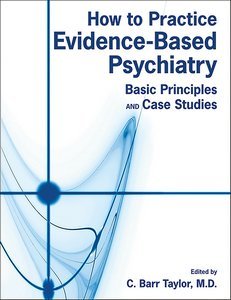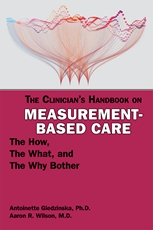How to Practice Evidence-Based Psychiatry
Basic Principles and Case Studies
View Pricing
Description
The use of evidence-based guidelines and algorithms is widely encouraged in modern psychiatric settings, yet many practitioners find it challenging to apply and incorporate the latest evidence-based psychosocial and biological interventions. Now, practitioners have an outstanding new resource at their fingertips. How to Practice Evidence-Based Psychiatry: Basic Principles and Case Studies accomplishes two goals: it explains the methods and philosophy of evidence-based psychiatry, and it describes ways in which psychiatrists and other mental health specialists can incorporate evidence-based psychiatry into their clinical practices. Uniquely relevant to psychiatric clinicians, this is the only book on evidence-based medicine specific to the field of psychiatry that addresses integrated psychopharmacology and psychotherapies.
This new book first provides an expansion on the popular text the Concise Guide to Evidence-Based Psychiatry, updating the sections on clinical trials, the teaching of evidence-based medicine, and the effective treatment of patients with complex comorbid conditions. It then allows experts from a variety of specialty areas and practice settings to describe how they incorporate the latest evidence and outcome studies into interesting and inspiring cases of their own.
The book starts with the assumption that clinicians must adapt guidelines, algorithms, other sources of evidence, and the interpretation of this evidence to each individual patient. It describes basic statistical concepts in an easily understood format and offers separate chapters devoted to systematic reviews and meta-analyses, clinical practice guidelines, diagnostic tests, surveys of disease frequency, and prognosis and psychometric measurement. It also presents an easily relatable discussion of many of the major issues of evidence-based psychiatry, such as use of the Five-Step evidence-based medicine model.
- The first section can be used both as an introduction to the topic and a ready reference for researching the literature and appraising evidence.
- The second section includes relevant case examples of major psychiatric disorders, and the third presents case examples from diverse treatment settings. In these sections, 24 contributing clinicians from a variety of practice settings discuss situations in which they followed aspects of evidence-based care.
- The text includes tables and charts throughout the text, including algorithms, guidelines, and examples of simple, therapist-devised measures of progress, further enhance learning, retention, and clinical practice.
How to Practice Evidence-Based Psychiatry: Basic Principles and Case Studies is a valuable new tool that will help residents, practicing psychiatrists, and other mental health workers find the most useful and relevant information to inform and improve their everyday practices.
Contents
- Contributors
- Disclosure of Interests
- Foreword
- Preface
- Cautionary Statement
- Acknowledgments
- PART I: Basic Principles of Evidence-Based Psychiatry
- Chapter 1. What Is Evidence-Based Psychiatric Practice?
- Chapter 2. The 5-Step Evidence-Based Medicine Model
- Chapter 3. Asking Answerable Questions
- Chapter 4. Searching for Answers
- Chapter 5. Clinical Trials
- Chapter 6. Systematic Reviews and Meta-Analyses
- Chapter 7. Clinical Practice Guidelines
- Chapter 8. Measurement
- Chapter 9. Diagnostic Tests
- Chapter 10. Surveys of Disease Frequency
- Chapter 11. Studies of Risk or Harm
- Chapter 12. Studies of Prognosis
- Chapter 13. Evaluating Your Performance of Evidence-Based Medicine
- Chapter 14. Evidence-Based Psychiatric Practice
- Chapter 15. Teaching Evidence-Based Medicine and Evidence-Based Psychiatric Practice to Psychiatry Residents
- PART II: Case Studies: Evidence-Based Medicine Applied to Major DSM-IV Disorders
- Chapter 16. Introduction to the Cases
- Chapter 17. Panic Disorder
- Chapter 18. Major Depressive Disorder and Bulimia Nervosa
- Chapter 19. Depression, Refusal to Eat, and Nasopharyngeal Carcinoma
- Chapter 20. Anorexia, Obsessive-Compulsive Disorder, and Depression
- Chapter 21. Major Depressive Disorder: A MEASUREMENT-BASED CARE APPROACH
- Chapter 22. Major Depressive Disorder, Severe With Psychotic Features
- Chapter 23. Acute Bipolar Depression
- Chapter 24. Obsessive-Compulsive Disorder
- Chapter 25. Schizophrenia: A FAMILY PSYCHOEDUCATIONAL APPROACH
- Chapter 26. Substance Use Disorder Presenting as a Mood Disorder
- Chapter 27. A Complex Personality Disorder Case
- Chapter 28. Bulimia Nervosa
- PART III: Case Studies: Evidence-Based Psychiatric Practice in Different Settings
- Chapter 29. Dual Diagnosis (PTSD/SUD) Treated in a Veterans Affairs Health Care Facility
- Chapter 30. Severe, Recurrent Depression Managed in a Remote Setting Via the Internet: AN EXAMPLE OF REMOTE CARE USING THE HEALTHSTEPS SYSTEM
- Chapter 31. Postpartum Depression Treated in Private Practice
- Chapter 32. Bipolar Disorder Treated in the Kaiser Permanente Health Care System
- Chapter 33. Consultation-Liaison Psychiatry
- Chapter 34. Alcohol Dependence Treated by a Psychiatry Resident
- Appendices
- A: Glossary
- B: Statistical Formulas and Tables
- Index
Contributors
- Bibi Das, M.D.
Ira D. Glick, M.D.
California
Gregory E. Gray, M.D., Ph.D.
Keith Humphreys, Ph.D.
Terence A. Ketter, M.D.
Lorrin M. Koran, M.D.
Ben Kurian, M.D., M.P.H.
Anna Lembke, M.D.
Steven E. Lindley, M.D. Ph.D.
Gretchen Lindner, Ph.D.
Joanna M. Marino, M.A.
Anthony J. Mascola, M.D.
Matthew H. May, M.D.
James E. Mitchell, M.D.
Douglas S. Rait, Ph.D.
James Reich, M.D.
Margaret F. Reynolds-May, B.A.
Anthony J. Rothschild, M.D.
Richard E. Shanteau, M.D.
Caroline Spiranovic, Ph.D.
Violeta Tan, M.D.
Dennis Tannenbaum, M.B.Ch.B., FRANZCP
C. Barr Taylor, M.D.
Madhukar H. Trivedi, M.D.
Po W. Wang, M.D.
About the Authors
C. Barr Taylor, M.D., is Professor of Psychiatry and Behavioral Sciences at Stanford University School of Medicine, Stanford, California.
Related Products
Carousel Control - items will scroll by tabbing through them, otherwise arrows can be used to scroll one item at a time








